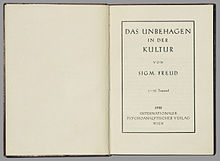Usage

The term appeared in Freud's Civilization and Its Discontents (1929–30) in relation to the application of the inborn aggression in man to ethnic (and other) conflicts, a process still considered by Freud, at that point, as a convenient and relatively harmless satisfaction of the inclination to aggression. [3] For Lacanians, the concept clearly related to the sphere of the Imaginary: the narcissism of small differences, which situates envy as the decisive element in issues that involve narcissistic image. [4] American psychiatrist Glen O. Gabbard has suggested that Freud's narcissism of small differences provides a framework to understand that in a loving relationship, there can be a need to find, and even exaggerate, differences in order to preserve a feeling of separateness and self. [5]
It has been pointed out that Jonathan Swift in his 1726 novel Gulliver's Travels described this phenomenon when writing about how two groups entered into a long and vicious war after they disagreed on which was the best end to break an egg. [6]
In terms of postmodernity, Clive Hazell argues that consumer culture has been seen as predicated on the narcissism of small differences to achieve a superficial sense of one's own uniqueness, an ersatz sense of otherness which is only a mask for an underlying uniformity and sameness. [7] The phenomenon has been portrayed by the British comedy group Monty Python in their satirical 1979 film Life of Brian, [8] by the comedian Emo Philips, [9] and by author Joan Didion in an essay (part of her 1968 book Slouching Towards Bethlehem ) about Michael Laski, the founder of the Communist Party USA (Marxist–Leninist). [10]
In 2010, author Christopher Hitchens cited the phenomenon when talking about ethno-national conflicts. [11] "In numerous cases of apparently ethno-nationalist conflict, the deepest hatreds are manifested between people who—to most outward appearances—exhibit very few significant distinctions."